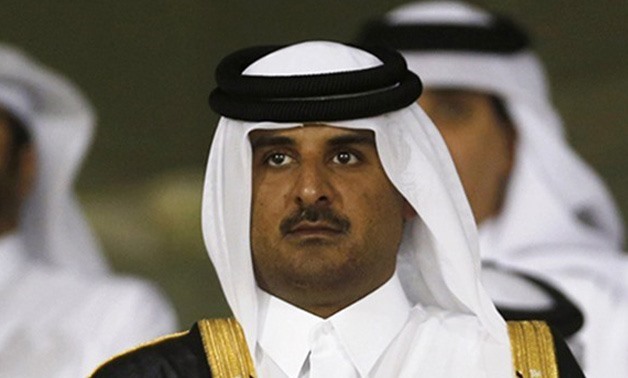
Qatari Emir Tamim bin Hamad- File photo
CAIRO – 16 June 2017: Qatar’s claims over alleged human rights violations caused by the Gulf blockade were met by mockery from regional and international media reporters attending the conference held in Geneva, Friday.
Qatar’s National Committee for Human Rights (NHRC) released a short report claiming that the severance of diplomatic ties between Qatar and the Gulf states had affected negatively the lives of Qataris, demanding compensation for the damage resulted from this decision.
 Qatar’s NHRC statment -press photo
Qatar’s NHRC statment -press photo
NHRC’s claims were widely questioned by the reporters as they completely contradicted statements from Qatari officials who insisted their country had not been negatively affectted.
 Qatar’s NHRC statment -press photo
Qatar’s NHRC statment -press photo
The Qatari report was met by a joint statement issued by permanent Missions Egypt, Saudi Arabia, UAE, Bahrain to the United Nations in Geneva, on the comment by the High Commissioner for Human Rights on the sovereign measures taken against Qatar.
Below is the full text of statement:
Following the comment issued by the High Commissioner for Human Rights on 14th June 2017, on the impact of the Qatar diplomatic crisis on human rights, in which he expressed his fear that the decisions taken will affect human rights and while regretting that this statement came at a time when communication with the Office of the High Commissioner remain open to ensure the rights of all concerned and to verify the information and allegations received, the Permanent Missions of Saudi Arabia, UAE and Bahrain to the United Nations in Geneva have emphasized the following:
1.Decisions to cut ties with Qatar are a sovereign right of the States concerned and aim to protect their national security from the dangers of terrorism and extremism. These decisions came after exhausting all possible means as a result of Qatar’s failure to comply with the Riyadh Agreement for the Return of Ambassadors and its Supplementary Agreement of 2014, and its continued support, funding and hosting of terrorist, extremist and sectarian organizations. These decisions were taken in full conformity with the fundamental principles of Public International Law.
2.Further to these decisions and for the sake of our brotherly Qatari people, which is a natural extension of its brothers in the three States, it was decided to take many measures aimed at addressing humanitarian and health cases, establish hot lines in each country so that cases can be reported and appropriate action be taken, in a manner consistent with international obligations under international human rights law and our long humanitarian traditions.
3.The Permanent Missions of the Kingdom of Saudi Arabia, the United Arab Emirates and the Kingdom of Bahrain reaffirm their willingness to continue working with the concerned parties in order to achieve the desired results of this break-up, namely, to maintain security, to combat terrorism and to safeguard the stability and well-being of the people of the region, including the brotherly Qatari people, in full respect for their human rights’ and international humanitarian law’s commitments.
Shortly after the conference Egypt, the UAE, Saudi Arabia and Bahrain issued another list of figures and institutions designated as terrorists in these Arab countries.
Qatar’s relations with several Arab states have been strained since 24 May over leaked statement attributed to the Qatari Emir Sheikh Tamim Al Thani criticizing Gulf foreign policy with Iran, describing it as “unwise.”
The Qatari crisis escalated when Egypt and a coalition of Arab states in the Gulf Cooperation Council (GCC) announced a coordinated diplomatic break with Qatar, including Saudi Arabia, the United Arab Emirates and Bahrain. The Arab countries, in dispute with Qatar, accused the peninsular country of funding Islamist terrorists, in part via the Doha-based al-Jazeera satellite channel.
“Low-paid migrant workers, mostly from countries in Asia and to a lesser extent Africa, continue to be abused and exploited. Workers typically pay exorbitant recruitment fees and employers regularly take control of their passports when they arrive in Qatar. Many migrant workers complain that their employers fail to pay their wages on time, if at all”, this was part of the Human Rights Watch report on Qatari approach to the rights field during 2016.
The HRW report is filled of hundreds of Qatari violations against the migrant labor added to several other international reports criticize deteriorated human rights in the tiny Emirate.


Comments
Leave a Comment